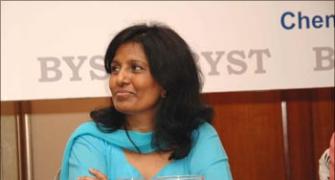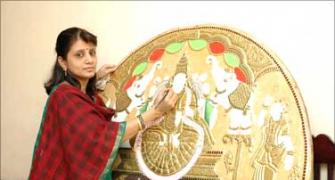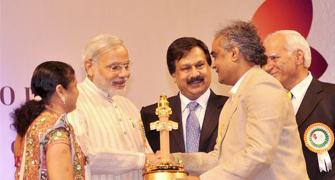'Kerala is a dreadful place to do business. You will not be able to run a profitable business in this state by giving high wages for low productivity.'
'That is the reason why nobody wants to invest in this state. Though there is a a small change happening, it will take years for Kerala to attract investors,' says Sheela Kochouseph Chittilapally, managing director, V-Star.
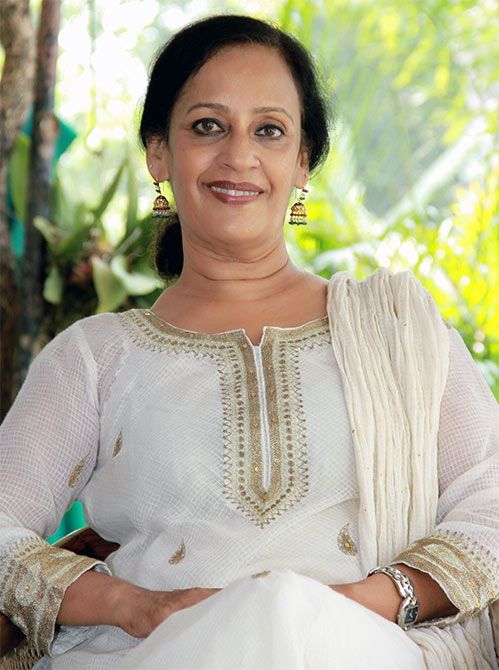
Photograph: Courtesy, V Star
Twenty years ago Sheela was just a housewife while her husband Kochouseph Chittilapally managed a successful company V-Guard, an electrical appliances manufacturer based in Kerala.
Today, Sheela in her early 60s is one of the most successful woman entrepreneurs in Kerala with a Rs 75 crore (Rs 750 million) business.
Her company, V-Star is one of the leading lingerie brands in Kerala, slowly expanding to the other southern states while 20 per cent of her business is from the Middle East market.
V-Star has 180 employees and around 2,000 people, mainly poor women from remote areas of Kerala who work indirectly as tailors.
Bullish on business prospects, the company expects a turnover of Rs 100 crore (Rs 1 billion) next year.
"It was a slow transformation of a simple housewife into a businesswoman. Today, I have the courage and confidence to talk to anyone. Sometimes I feel all the housewives have such abilities in them but they remain hidden as they get no exposure," Sheela Kochouseph tells Shobha Warrier/Rediff.com recounting her journey from a housewife to a successful entrepreneur.
Your husband is a successful businessman. Did you ever think of joining him?
My husband had resigned his job and started his own business just six months before our marriage in 1977.
It was just a humble beginning, a small business run from a room with just five people. We were staying in a rented house and had only a scooter then.
Today, that business has grown into a Rs1,500 crore (Rs 15 billion) empire!
When my children grew up, I started going to his office but I soon found his electronic business was not my cup of tea.
By then, the entrepreneurial bug had bitten me; I also wanted to start something of my own. I told him I wanted to start a garment shop as I was always interested in designing.
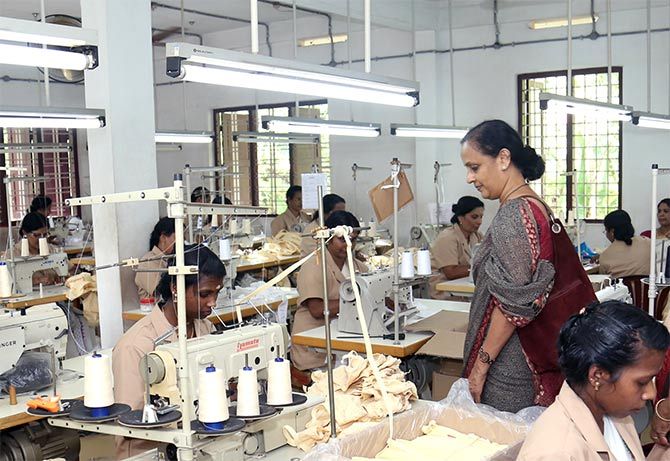
How was the beginning? With how much capital did you start the garment shop?
My husband had a building that was unused. I converted it into my factory. But he insisted that I should pay the rent. I also took a loan of Rs 20 lakh from him for the initial investment; to buy machines and other accessories. I employed 10 people.
I bought dress materials from Mumbai, designed and stitched salwar kameez and kept them in my boutique but the venture turned out to be a disaster. In the first few months, I didn’t even have money to pay rent to my husband.
I decided to close the boutique and started supplying to various shops.
For that, I employed a marketing manager. I was selling the dresses under the label V-Star which was registered by my husband earlier.
Were the initial days tough?
Yes, the initial days were quite tough. It took four years for the business to be profitable. When I employed people, they looked at my venture as the sister concern of V-Guard, so I had to give them the same salary that my husband was offering. It was not easy for me.
Though I found it tough to repay the loan in the first four years, I was determined to make it a success. I took it as a challenge.
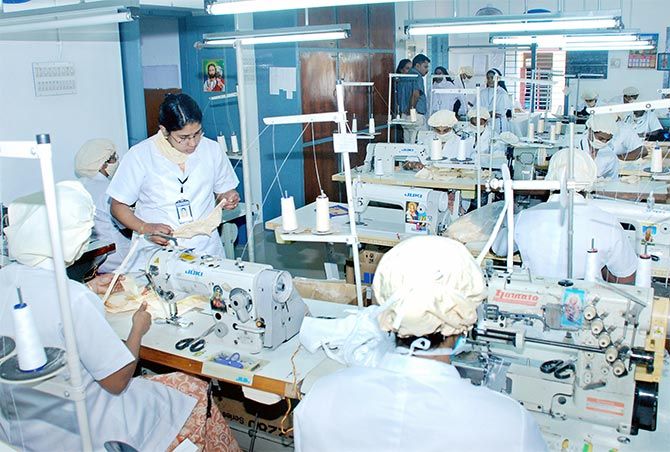 How long did it take you to make your brand visible?
How long did it take you to make your brand visible?
It took me 4-6 years to make the brand V-Star successful. By 2000, it was Rs 6 crore (Rs 60 million) venture.
However, in 2000 I decided to venture into the lingerie business as I found that there was a demand for brassieres.
Many shopkeepers who were my customers asked me why I was not making brassieres as there was a dearth of quality bras.
As our dresses had superior quality, they wanted me to venture into making brassieres. So, it was the shopkeepers who gave me the idea to diversify my business.
I took their suggestion as a challenge. By then, I had 50 people working for me and I learnt the technique of making perfect bras in no time and named it, Vanessa.
Vanessa was a huge success because as a woman I could contribute a lot to make products appreciated by customers.
Today, we are the number one lingerie brand in Kerala, which I feel is a great achievement.
Soon, we started making lingerie for both men and women, and also other accessories like leggings, etc. We could overtake all the established brands in no time.
From Rs 2 crore turnover in the first year, we started growing 100 per cent yearly. This year, our turnover will be Rs 75 crore (Rs 750 million) and next year, we will touch Rs 100 crore (Rs 1 billion).
How did everyone react to your brassiere business?
Kerala being a conservative society, I was looked at as someone who did something wrong. It was as if I was doing a dirty business.
Not bothering about what the society said or felt, I decided to market my product well.
We hired a very beautiful model to promote our products. We then put up huge hoardings of the model promoting our products.
We also gave advertisements as the centre spread in the popular women’s magazines in Kerala.
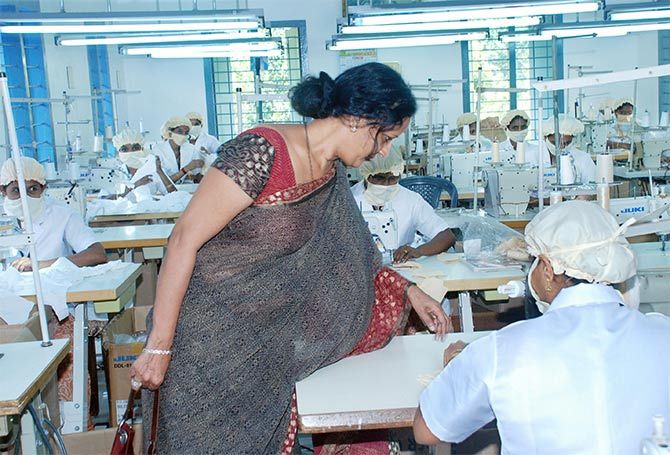 What was your husband’s reaction when you put up such hoardings in the city?
What was your husband’s reaction when you put up such hoardings in the city?
He said he felt ashamed as many of his friends teased him.
I told him that there was nothing to feel ashamed of as all women use these products.
I told him that if he was proud of the stabilisers he made, I was also proud of the brassieres I make.
I asked him, how could I do business without showing my product?
If you come to my office, you will see brassieres on my table when I discuss about the products with my managers.
It is not a product to feel ashamed of. It is not an obscene product. I used to get letters from people asking me whether I am not ashamed of doing such a business. I never bothered about such comments as I was selling a product that everyone uses.
Today, lingerie has become a glamorous product but it was not so when I started 14 years ago.
Where are your manufacturing units?
All out knitted products are made in Tirupur in Tamil Nadu. We have taken a factory on lease and we plan to open an office and own factory very soon.
Why did you decide not to have a factory in Kerala?
The political atmosphere in Kerala is not conducive to have a factory with 500 people. If I were to start such a factory here, within a month, you will have four trade unions and I would have to take their permission to take every decision.
Kerala is a dreadful place to do business. Keralites have forgotten to work; they only know to obstruct work and gherao those who work. You will not be able to run a profitable business in this state by giving high wages for low productivity.
That is the reason why nobody wants to invest in this state. Slowly, I see a small change happening here but it will take years for Kerala to attract investors.
Kerala is the only state where unions collect money for just looking at other workers loading and unloading stuff. The call it ‘nokku kooli’ which itself means money to just watch others do the work. Does any other state have such a stupid thing?
People here are so scared of these rogues that they give in to their demands. As a result, they have flourished.
Only those who have the courage to face such unions can do business here. The attitude in Kerala even today is that those who do business are anti-people and they exploit the poor.
This attitude has to change. Why do you do business? To make profit and not to lose your money, and it is not to exploit anyone.
My husband had such a bad experience in 1985 that V-Guard started outsourcing from then on, and he stopped employing people in Kerala.
I also follow the same thing as I do not want red flags in front of my factory; I want work to be done.
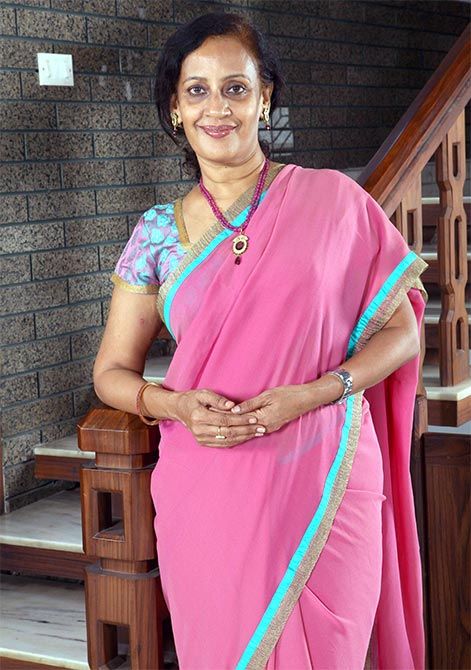
The hosiery products, you said are made in Tirupur. Where do you have your other manufacturing units?
I have 16 units in Kerala but all of them are outsourced. They are all done in various convents located in the remote places where an average of 50 women work in each unit.
On an average, we make 4.5 lakh brassieres every month. I have stopped the garment business completely. We have rebranded all our inner wear products under one brand, V-Star and also redesigned the logo.
How did you get the confidence to take bold decisions as a woman?
It took least five years for me to even realise that I was a business woman. Since I was just a housewife with absolutely no experience doing business, making business plans and strategies. Initially I didn’t even know what to or how to talk to my employees.
It was a slow transformation of a simple housewife into a businesswoman. Today, I have the courage and confidence to talk to anyone. Sometimes I feel all the housewives have such abilities in them but they remain hidden as they get no exposure.
I tell other women to try to explore the world on their own with courage and confidence as nobody will give anything to you on a platter; you have to discover the right options.
What were the biggest challenges you faced as an entrepreneur?
Marketing the products and retaining the employees were the biggest challenges. Luckily, I have very good people working for me today.
Are you ambitious as a businesswoman?
When I became an entrepreneur at 40, I was not at all ambitious but today, I am very ambitious.
I have competition at home itself with my husband and sons doing better than me; they have a Rs 1,500 crore business while mine is the smallest business here at just Rs 75 crores!

